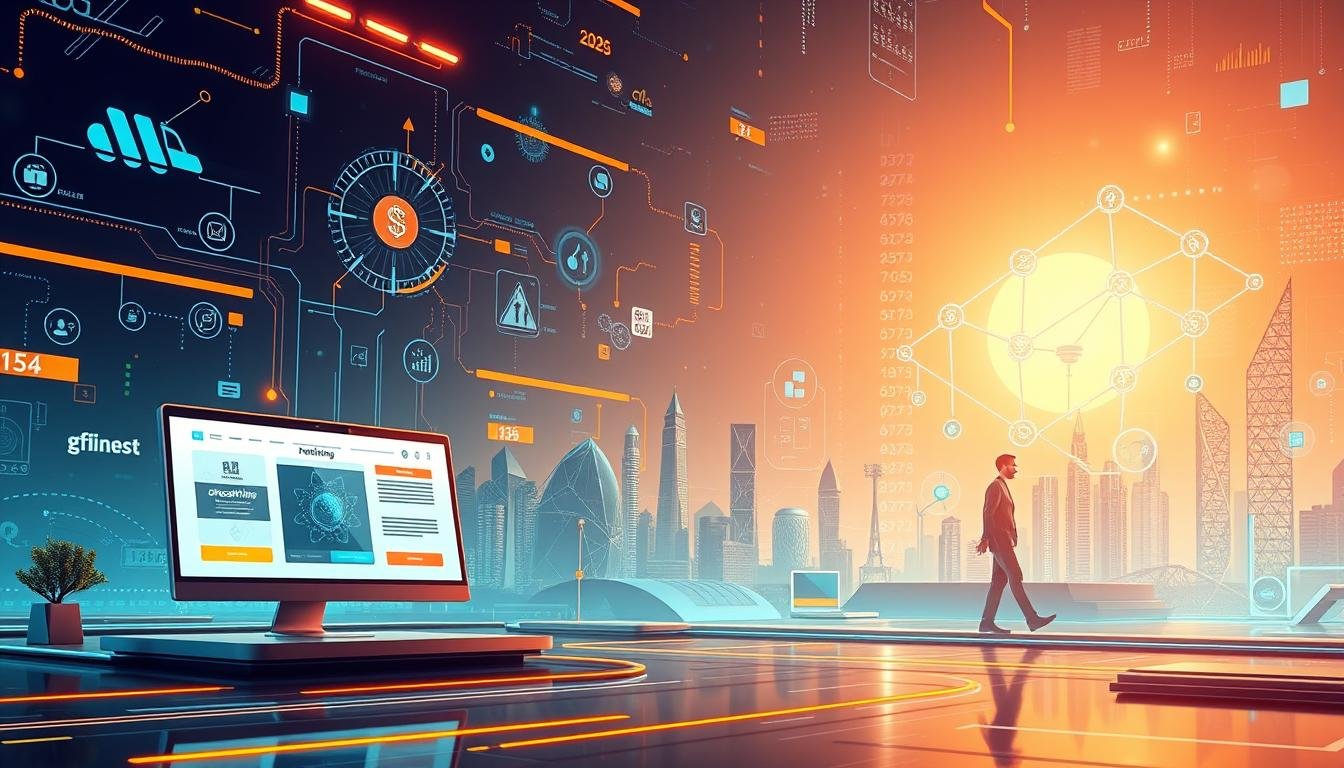The Rise of Artificial Intelligence: How It’s Changing Our World
Artificial Intelligence (AI) is no longer just a dream—it’s here and changing fast. By 2023, over 75% of businesses worldwide used AI tools. This has changed industries like healthcare and entertainment.
Think about your morning. You might use voice commands to smart speakers like Amazon Alexa. Or get movie tips from Netflix. Your phone even recognizes your face thanks to AI.
AI is making self-driving cars and helping with medical tests. It’s solving problems we thought were impossible.
But AI also raises big questions. How will it change jobs? Can it be fair? This article looks at AI’s impact, its breakthroughs, and how it’s changing our lives.
The Unprecedented Rise of Artificial Intelligence in Modern Society
Artificial intelligence has moved from being just a dream in books and movies to a key part of ai in modern technology. It now powers big changes in healthcare, transport, and even our daily lives with voice assistants. This change is changing how we interact with and rely on smart systems.
From Science Fiction to Reality: The Evolution of AI Technology
Old stories like 2001: A Space Odyssey showed us AI like HAL 9000. Now, ai-driven innovation has made Siri and Alexa a part of our lives. These tools use natural language and real tasks, showing us that what was once science fiction is now everyday reality.
Key Milestones in AI Development Over the Past Decade
- 2012: Breakthrough in image recognition via deep learning (AlexNet)
- 2016: AlphaGo defeats world champion in Go, showcasing strategic AI
- 2020: GPT-3 revolutionizes text generation with 175 billion parameters
Each milestone has shown us what machines can learn and do on their own.
How AI-Driven Innovation is Reshaping Our Technological Landscape
Hospitals now use AI to spot diseases quicker than doctors. Self-driving cars from Tesla use real-time data. Smart homes with Alexa show how AI is part of our daily lives. These changes suggest a future where AI makes complex decisions on its own.
As AI grows, it will help solve big problems like climate change and personalized medicine. It promises a future where technology meets our needs better than ever before.
AI’s Transformative Impact Across Industries and Daily Life
Artificial intelligence is changing businesses in big ways. In healthcare, AI can analyze medical scans quicker than doctors. Companies like IBM use Watson to speed up finding new drugs, saving years of research time.
Finance giants like Goldman Sachs use AI for smart trading. Mastercard uses it to spot fraud right away. Siemens in manufacturing cuts downtime by 20% with AI for predictive maintenance. Retailers like Amazon use AI to improve inventory and suggest products just for you.
- Healthcare: Google’s DeepMind works with hospitals to predict kidney injuries with AI.
- Finance: JPMorgan Chase’s COiN makes loan document processing fast, in seconds.
- Manufacturing: Bosch cuts costs by 15% with AI for better factory workflows.
AI is also changing our daily lives. Voice assistants like Alexa and Google Assistant control our homes. Waze helps drivers find the best route with real-time data. Netflix and Fitbit use AI to make our entertainment and health tracking better.
- Smart speakers handle 100 million commands daily in US homes.
- Spotify’s Discover Weekly makes playlists for 200M+ users every week.
But there are ethical worries about AI. Facial recognition mistakes in policing, like Amazon’s issues with law enforcement, show bias risks. Job fears in logistics and customer service are real. There are also doubts about loan and hiring algorithms.
We need to find a balance between AI’s benefits and its risks. This means creating rules that keep innovation going while ensuring fairness and transparency.
Conclusion: Navigating the Future of AI in an Evolving World
The future of artificial intelligence depends on finding a balance. As new technologies like quantum computing and human-machine teams come along, we must make big choices. These advancements bring hope for better healthcare, climate solutions, and smarter cities.
But, we also face big ethical questions about ai. Issues like privacy and bias need our immediate attention. It’s crucial to address these concerns.
To stay ahead, we can explore free ai research and join efforts like MIT’s AI Policy for the People. Companies should be open about their ai use. Governments need rules to keep things fair.
The EU’s AI Act and global standards like the OECD’s AI Principles are steps in the right direction. But, we must work together to make progress.
Our choices today will shape how ai affects our education, jobs, and everyday lives. By questioning data fairness and algorithmic effects, we can help ai grow responsibly. The future of ai is not just about tech—it’s about making progress that benefits everyone.
FAQ
What are some of the most notable AI advancements in recent years?
Recent years have seen big steps in AI. We’ve made progress in machine learning, natural language processing, and computer vision. Now, we have self-driving cars, smart home assistants like Amazon Alexa, and advanced health diagnostic tools.
How is AI used in everyday life?
AI is all around us. It’s in personal assistants like Siri, Netflix recommendations, and customer service chatbots. These tools make our lives easier and more efficient.
What is the impact of AI on society?
AI’s impact is complex. It brings innovation and efficiency but also raises privacy, job loss, and inequality concerns. We must consider these issues as AI evolves.
How is AI shaping the future of business?
AI is changing business operations. It uses data analytics, automates tasks, and helps make better decisions. For example, AI helps in predictive analytics, enhancing marketing and customer service.
What are some ethical concerns surrounding AI?
Ethical worries about AI include bias, job loss, and transparency. These issues highlight the need for responsible AI use. We must ensure fairness and accountability.
How can individuals prepare for the future of artificial intelligence?
To prepare, stay updated on AI advancements. Engage in discussions, learn about AI, and support ethical practices. This way, we can navigate the AI future responsibly.












